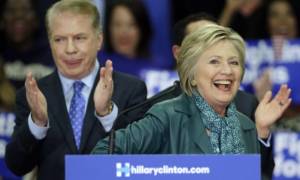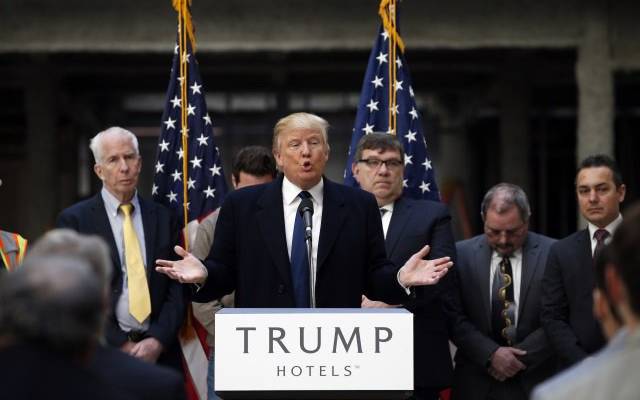While both front-runners scored victories in the night’s biggest prize of Arizona, Democratic challenger Bernie Sanders won caucuses in Utah and Idaho and Republican Ted Cruz claimed his party’s caucuses in Utah.
Under the shadow of overseas violence, Republican Donald Trump and Democrat Hillary Clinton traded wins with their chief rivals on Tuesday and attacked each other’s foreign policy views as the 2016 presidential contest turned into a clash over who could best deal with the threat of Islamic terrorism.
The victories kept Clinton and Trump from dominating another election night, but they both maintained a comfortable lead in the race for delegates who will choose each party’s nominee at national conventions in July.
Long lines and high interest marked primary elections across the three Western states as the world grappled with a new wave of bloody attacks in Europe. The Islamic State (ISIS) group claimed responsibility for blasts at the airport and a subway train in Brussels that left dozens dead and many more wounded.
“This is about not only selecting a president, but also selecting a commander-in-chief,” Clinton said in Seattle as she condemned Trump by name and denounced his embrace of torture and hardline rhetoric aimed at Muslims. “The last thing we need is leaders who incite more fear.”
Trump, in turn, branded Clinton as “Incompetent Hillary” in an interview with Fox News as he discussed her tenure as secretary of state. “Incompetent Hillary doesn’t know what she’s talking about,” the billionaire businessman said. “She doesn’t have a clue.”
Voters Rush to the Polls
The back and forth between the front-runners came amid a frenzy of activity from voters eager to make their voices heard in the 2016 election.
In Utah, caucus-goers were dispatched by poll workers to local stores with orders to buy reams of paper and photocopy fresh ballots amid huge turnout. The state Democratic Party’s website crashed due to high traffic.
In Arizona, voters waited two hours or more in some places to cast primary ballots, while police were called to help control traffic.
As voters flooded to the polls, the presidential candidates lashed out at each other’s foreign policy prescriptions, showcasing sharp contrasts in confronting the threat of Islamic terrorism.

Democratic presidential candidate Hillary Clinton. (AP/Ted S. Warren)
Clinton — and Trump’s Republican rivals — questioned the Republican front-runner’s temperament and readiness to serve as commander in chief, and condemned his calls to diminish US involvement with NATO.
Addressing cheering supporters in Seattle, Clinton said the attacks in Brussels were a pointed reminder of “how high the stakes are” in 2016.
“We don’t build walls or turn our back on our allies,” she said, in an apparent reference to Trump’s call to build a wall along the Mexican border. “We can’t throw out everything we know about what works and what doesn’t and start torturing people.”
Cruz seized on Trump’s foreign policy inexperience while declaring that the US is at war with the Islamic State group.
“He doesn’t have the minimal knowledge one would expect from a staffer at the State Department, much less from the commander in chief,” Cruz told reporters. “The stakes are too high for learning on the job.”
The conservative Texas senator also issued a statement following the Brussels attacks that it was time for law enforcement to “patrol and secure Muslim neighborhoods before they become radicalized,” without providing more details.
In interviews on CNN, Trump said he supported Cruz’s surveillance proposal “100 percent,” while Ohio Gov. John Kasich opposed it.
Trump’s brash tone has turned off some Republican voters in predominantly Mormon Utah, where Cruz claimed more than half of the caucus vote — and with it, all 40 of Utah’s delegates.
Yet that wouldn’t make up for Trump’s haul in Arizona, where he earned the state’s entire trove of 58 delegates.
Arizona’s win gives Trump a little less than half of the Republican delegates allocated so far. That’s still short of the majority needed to clinch the nomination before the party’s national convention this summer.
However, Trump has a path to the nomination if he continues to win states that award all or most of their delegates to the winner. Overall, Trump has accumulated 739 delegates, Cruz has 465 and Kasich 143. It takes 1,237 delegates to win the Republican nomination.
Trump’s rivals’ best hope is to deprive him of the majority of delegates needed to win the nomination outright and force a contested convention.
Clinton Has Big Delegate Advantage Over Sanders
On the Democratic side, Clinton’s delegate advantage is even greater than Trump’s.
Coming off last week’s five-state sweep of Sanders, the former secretary of state entered Tuesday leading by more than 300 pledged delegates. With Sanders standing to win at least 57 delegates to Clinton’s 51 on Tuesday, that wasn’t about to change.
Neither was Sanders’ commitment to carry on.
“These decisive victories in Idaho and Utah give me confidence that we will continue to win major victories in the coming contests,” he said in a statement.
Still, Clinton now has a total delegate lead of 1,214 to Sanders’ 901, based on primary and caucus results. Overall, Clinton has at least 1,681 delegates to Sanders’ 927 when including superdelegates, Democratic lawmakers and party officials who can vote for any candidate at the convention.
By: AP










